Five years ago, I decided to quit social media for my business entirely. Looking back, it was one of the best decisions I’ve ever made for my business and well-being. Social media drained me, and I realized I didn’t need to be constantly plugged in to create a thriving business.
In this post, I want to share my experience with you in hopes it inspires or encourages you to consider whether social media is really serving your needs or whether it might be time to create a more sustainable marketing approach. There’s no one-size-fits-all formula, and it’s okay if your path looks different from the typical social media playbook.
A quick note before we begin:
When I say I quit social media, I mean for my business. I’m an avid Instagram user in my personal life. I use it to share my calm life and creativity through stories, reels, and posts. For reasons I can’t fully put into words, it simply feels lighter, freer, better when it’s not tied to business or marketing goals. This post isn’t anti-social media; it’s just a reflection on how I’ve built my business without needing to be on it.

Marketing without Social Media: My Takeaways from the Last 5 Years
1. It is possible to run a business without social media
Service providers often see social media as the lifeblood of business growth and can’t fathom the possibility of going without it. It’s easy to believe that if you’re not on social media, you’re missing out on all the opportunities to grow your business, connect with clients, and build visibility. I used to believe that too. There’s still so much fearmongering around quitting social media that some service providers stay out of fear.
But after five years of successfully running my business without social media, I can confidently say that it’s not only possible to market without it, but marketing is simpler and more aligned without it.
Although I find social media deeply problematic, I’m not against it per se, nor do I think not using it is morally superior. I think social media is more effective and aligned for certain types of people, and you take back your power once you recognize and accept it’s not for you. It’s not giving up opportunities and visibility, it’s making space for more intentional, sustainable, and focused strategies that work for your nature and business goals.
Social media is just one piece of the marketing puzzle. It may work well for some, but it doesn’t work for everyone, and that’s okay. For those of us who are introverted, sensitive, or simply feel overwhelmed by the rapid pace of social media, there are other, less draining ways to share your message and meet aligned clients that don’t require a constant Instagram presence.
Marketing without social media doesn’t mean isolating yourself, not being visible, or disappearing altogether. It means embracing different platforms and tools that better align with you. Whether it’s focusing on SEO, growing your business blog, creating content on Pinterest, or building relationships through email, there are plenty of other avenues to explore.
So, if you’re feeling the weight of social media and wondering if there’s another way to market your business, the answer is yes. It is possible, and might even lead to more meaningful connections with the people who need your services most!
Further reading: Slow Marketing: How to Choose Content Marketing Strategies That Feel Good & Attract Aligned Clients
You’re not giving up opportunities and visibility, you’re making space for more intentional, sustainable, and focused strategies that work for your nature and business goals.
2. It was seamless because I had other strategies in place
One of the reasons leaving social media felt manageable was that I wasn’t starting my marketing from scratch… again. I had eggs in multiple baskets, and those other eggs (particularly Pinterest and SEO) were already helping me grow my discoverability and reach a new audience.
From day one, I focused on making my website the heart of my online presence, with all other platforms pointing back to it. All roads lead to Rome! I published blog posts, created pins, sent emails, and worked on my website SEO. When I quit social media in January 2019, I was about a year into this business and actively building my long-term marketing strategies. They were starting to gain traction and provide a steady stream of visitors.
At the time, I also had a few long-term Pinterest management contracts, which provided a sense of security in terms of income, just in case something went wrong or I wasn’t able to secure new clients right away. In the end, my traffic picked up just fine, but it was reassuring to have some steady, long-term work secured.
While I’m on the topic of diversifying your eggs, here are a few tips for you.
I’ve been telling my clients for years not to let the social media hivemind convince them that they don’t need a website and blog for their business, and now I’m sharing the same advice with you. Building your business and selling your services on platforms like Instagram or TikTok may seem like a good idea until it isn’t. The platform changes, you decide to leave, or it gets banned, and suddenly you lose everything you’ve worked for. Always prioritize the platforms you own.
A great example is what I’m seeing unfold with the current marketing trends and the potential TikTok ban. People are realizing that relying on social media for business growth might not be as reliable as they thought, and that blogging is the way to go in 2025 (it is). But now, they’re in a tough spot because they don’t even have a website, let alone a blogging and SEO strategy to get found on Google. I’m not sure who’s been spreading the myth that blogging is dead, but they’ve done a disservice to these business owners. Now, it’s going to take a lot of work and time to gain visibility.
Always prioritize the platforms you own.
3. It was the best decision for my nature and health
I still remember the immense relief I felt when I deleted my Instagram content and hid my Facebook page. It may sound dramatic, but I could finally breathe again. I no longer felt the expectation to show up online. The performance on the hamster wheel was over. The mental clutter social media created – wondering if I was posting enough, engaging enough, or doing the right things to please the algorithm – was replaced with a sense of calm and clarity.
When I worked in social media management, I always knew social media didn’t suit me, but I blamed my introversion. Later, I realized that although my introverted and sensitive nature made the effects of social media feel more pronounced for me, the real problem was much bigger.
As humans, we’re not designed for social media, but social media is made for us. No wonder we feel tired and stressed when we’re constantly processing an endless stream of information, battling comparison, eroding our attention spans, and trying to keep up with an unnatural pace of interaction. It’s overwhelming, and, frankly, it’s insane. What are we doing?
Leaving social media meant freeing myself from the constant barrage of noise and building a marketing strategy around my strengths instead of forcing myself into a mold that doesn’t suit me. Instead of pushing myself to be more outward-facing when I naturally prefer making waves quietly, I made my introversion and sensitivity my best assets. Now, I share my business online naturally and sustainably. I no longer feel the pressure to be “on” or constantly visible. It’s great for my nervous system.
I also feel the positive effects on my overall well-being. I’m no longer stretched thin, trying to be everywhere at once, which means I have more energy for the things that truly matter to me in my business and life. Without social media, I’m no longer comparing myself to others or feeling the subtle pressure to measure up to someone else’s version of success. I’ve written about this before, emphasizing the importance of keeping a tight sphere of influence around my thoughts and creativity and moving away from social media has made that so much easier.
Further reading: HSP in Business: 5 Mindful Ways I Prioritize Calm
The mental clutter social media created – wondering if I was posting enough, engaging enough, or doing the right things to please the algorithm – was replaced with a sense of calm and clarity.
4. It was the first domino in breaking free from the “shoulds”
Getting off social media was initially a marketing decision, but it became a pivotal moment that led me to reevaluate many other “shoulds” I had unknowingly absorbed about running a business.
One of the reasons I decided to leave social media was the realization that I had been using it for the wrong reasons. I was there because I thought I had to be if I wanted to succeed. When that switch flipped and I chose to walk away, I began asking myself what other rules I was following simply because I thought I had to.
It felt good to get clarity and courage to question other norms that weren’t serving me. I realized I didn’t need to hustle, run big launches, create courses or memberships, or work unhealthy hours to build a thriving business. I didn’t have to mold myself to fit a traditional, extroverted business model. Instead, I started designing my business around my life, not the other way around.
The cookie has crumbled piece by piece, but I’ve learned to embrace choices that align with my strengths and values, even if they seem unconventional. Untethering from the “shoulds” also freed me from the pressure to pursue someone else’s version of success. I stopped chasing arbitrary goals, like hitting six figures or growing an enormous audience, and instead focused on what truly matters to me: having the freedom to do work I enjoy, collaborating with aligned clients, and maintaining a satisfying life outside of my business.
If I hadn’t made that shift, I probably wouldn’t be where I am today.
Further reading: 5 Ways I’m Leaning Into Gentle Marketing and a More Peaceful Business
5. I’m attracting more like-minded people because of it
The best part – and the most unexpected side effect – of leaving Instagram and other social media is that I attract like-minded people because of it.
When I was active on social media, I felt like I was casting a wide net and competing for attention in a noisy and crowded space. It felt like a marketplace where every vendor was shouting for attention, trying to convince the buyer to visit their stand. The sheer volume of posts, ads, and shallow interactions made it challenging to stand out, let alone connect with the right people. I tried to create content my way, but that wasn’t what the algorithm favored, so I had to water down my message and take the L.
Over the past five years, I’ve shared my experiences and thoughts more openly here, causing an influx of amazing people who truly resonate with my values and work. Clients and readers who find me through Pinterest and Google often share how glad they are to have found me because they recognize themselves in my content and feel seen and understood. Many have even said that they did not realize not using social media is an option until they read about my experience.
I didn’t lose my audience (or my business) by leaving social media: instead, I built a smaller, quieter, more thoughtful, and aligned audience. For that, I am forever grateful. It’s a powerful reminder that when you lean into your truth, the right people will find you.
What other rules are you following simply because you think you have to?
6. Slow and steady wins the race
Leaving social media has also made me more intentional in every aspect of my marketing. Less is more, quality over quantity.
In the past, marketing often felt like a to-do list that I had to tick off to feel like I was doing enough. I always felt like I was striving, but never truly enough.
By shifting my energy from social media to slow and steady channels like Pinterest, Google, and my website, I created a quieter, more intentional marketing ecosystem that naturally draws in the right audience. I’ve been able to slow down, make my marketing introvert-friendly, and get well-rooted in my strategy. These days, I’m in a flow and enjoy my marketing activities because I’m not just showing up to fill a space or tick off a box.
These are my main lessons from the past five years. If I had to choose one word to describe the journey, I’d choose “liberating”. My journey ended up being so much more than rejecting social media. It’s a story of finding what truly works for me, embracing my natural quirks, and trusting that the “slow” in slow marketing and slow living means making intentional choices that yield the right results for me.
So if you’ve ever felt the pull to untether from the “shoulds,” and embrace a quieter approach to business, I encourage you to listen to that inner voice. Trust your instincts, lean into your strengths, and design a marketing strategy that works for you.
Did something resonate? Save those thoughts for later.
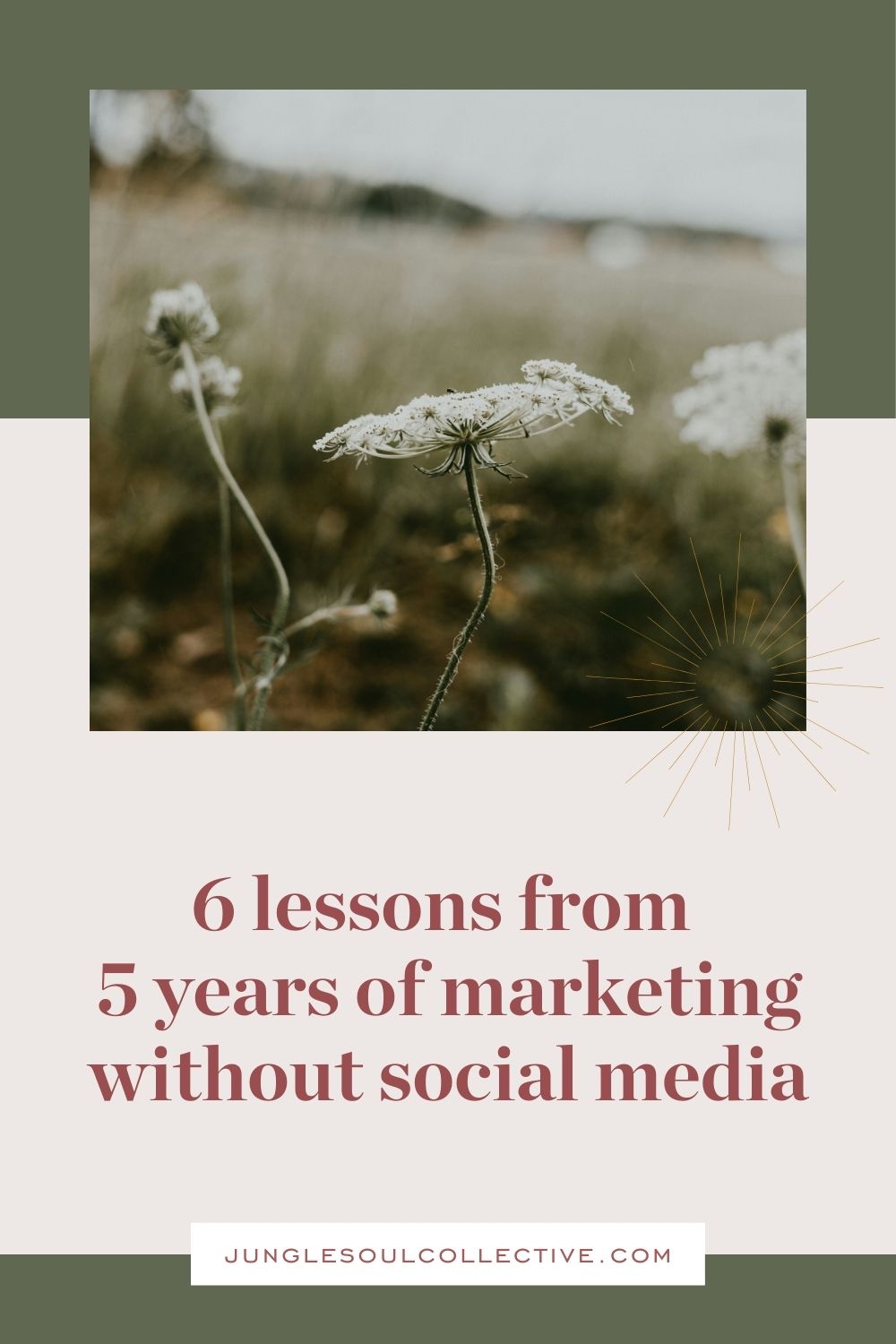
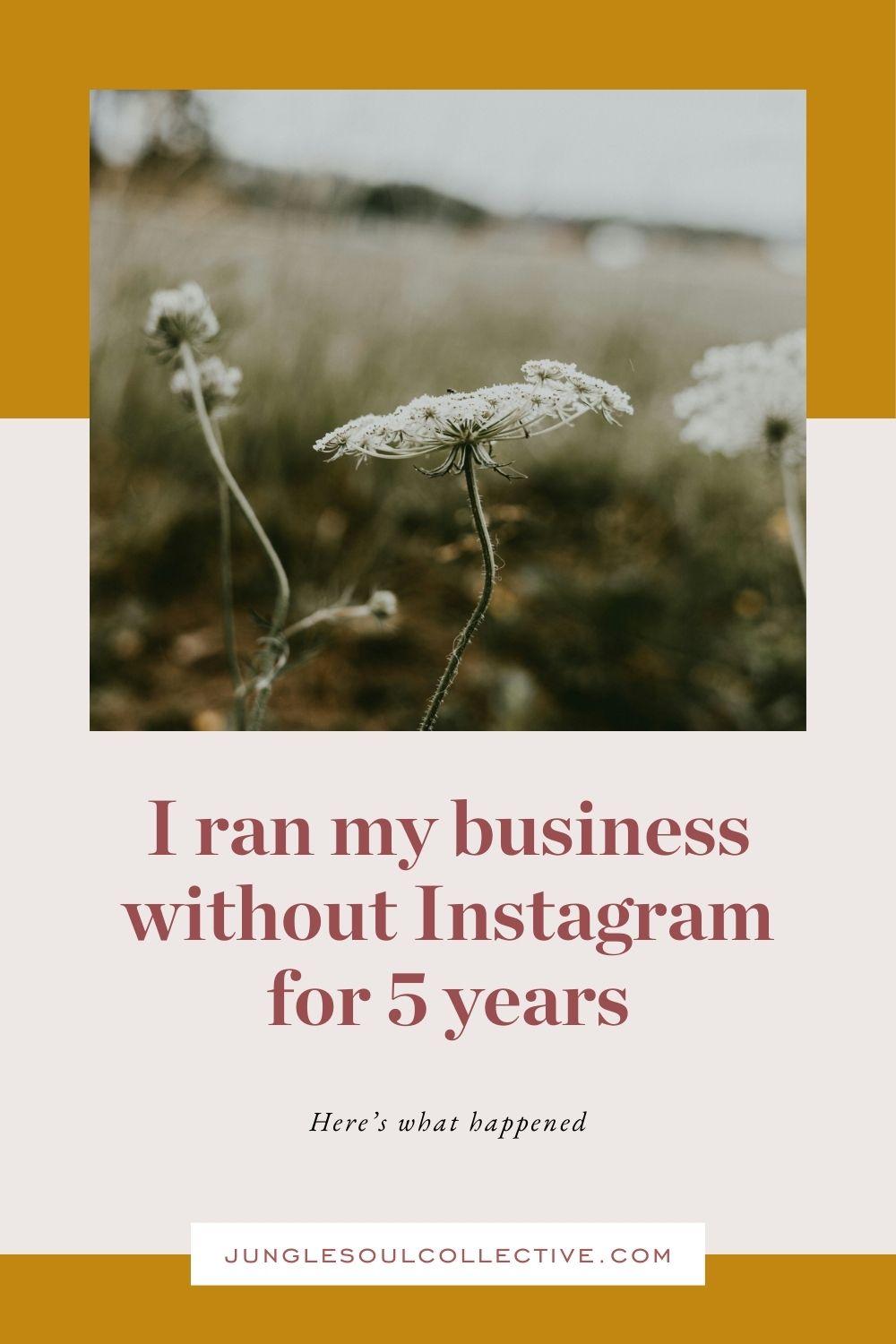




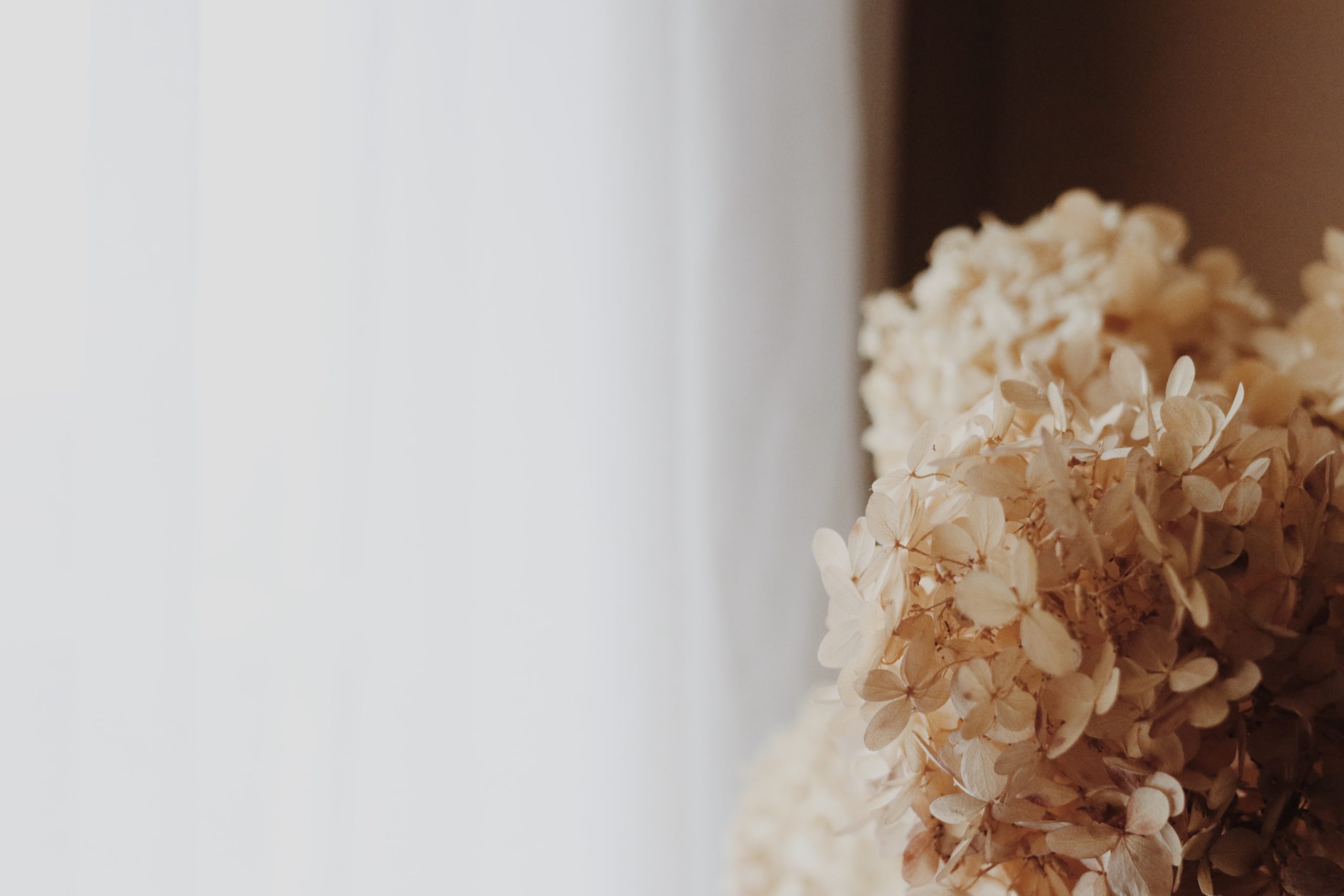
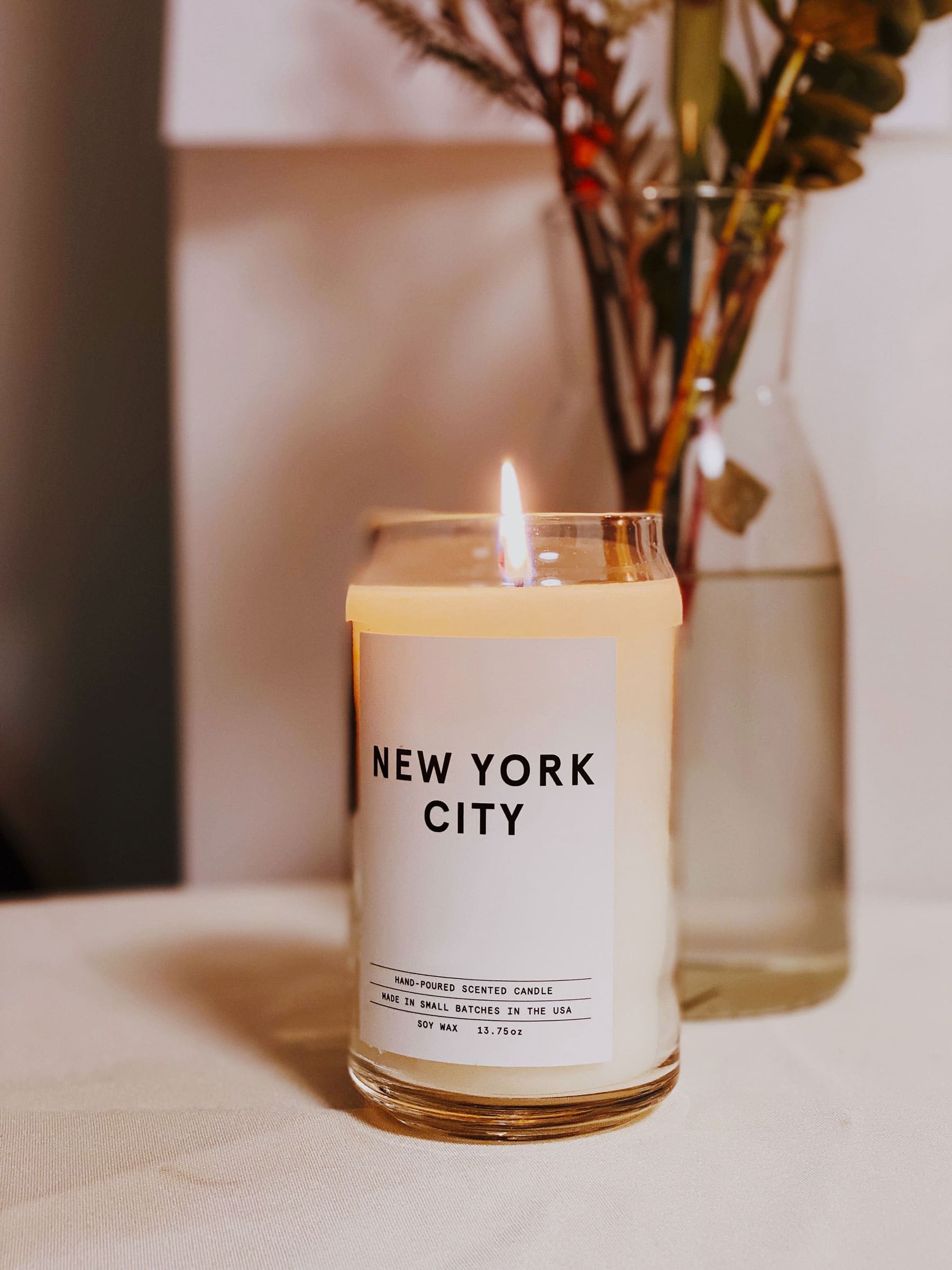
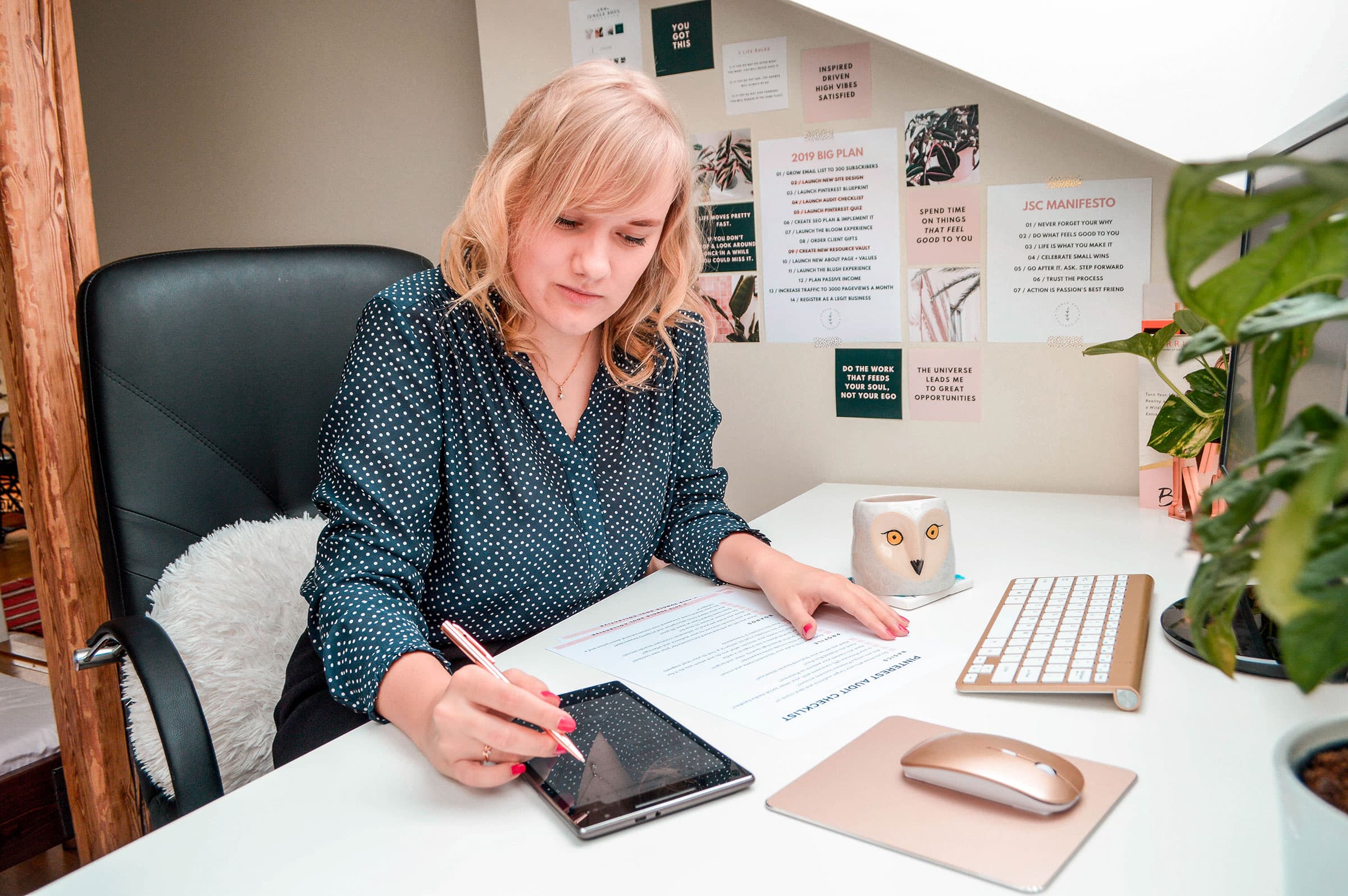

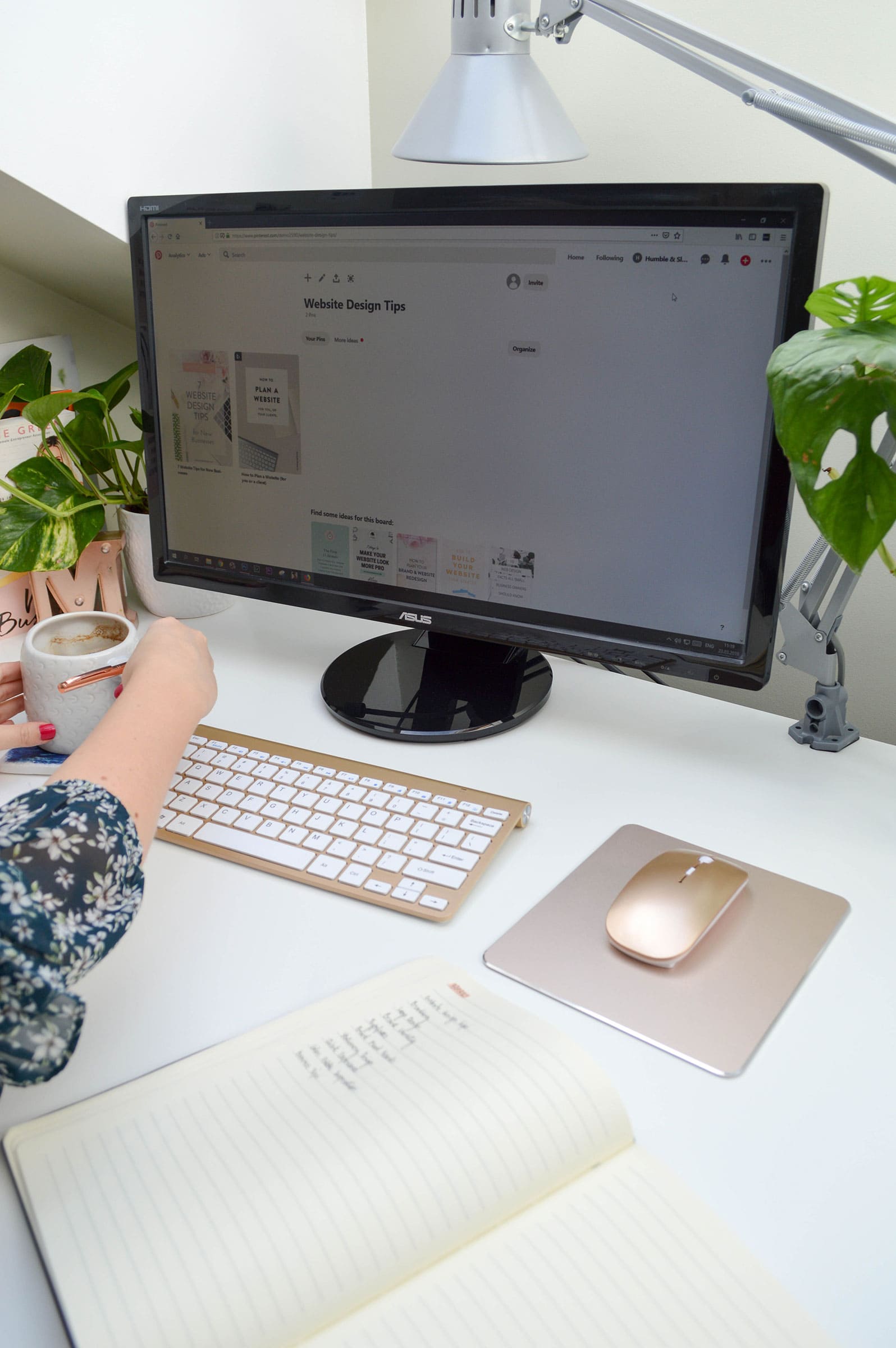






Hi Maris,
I can’t pin the images since your website cannot be copy-pasted, I think.